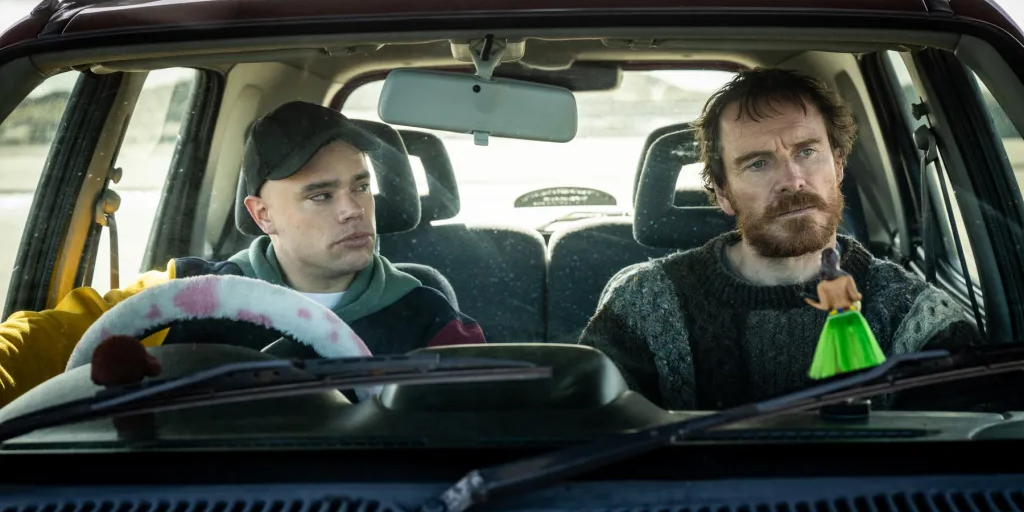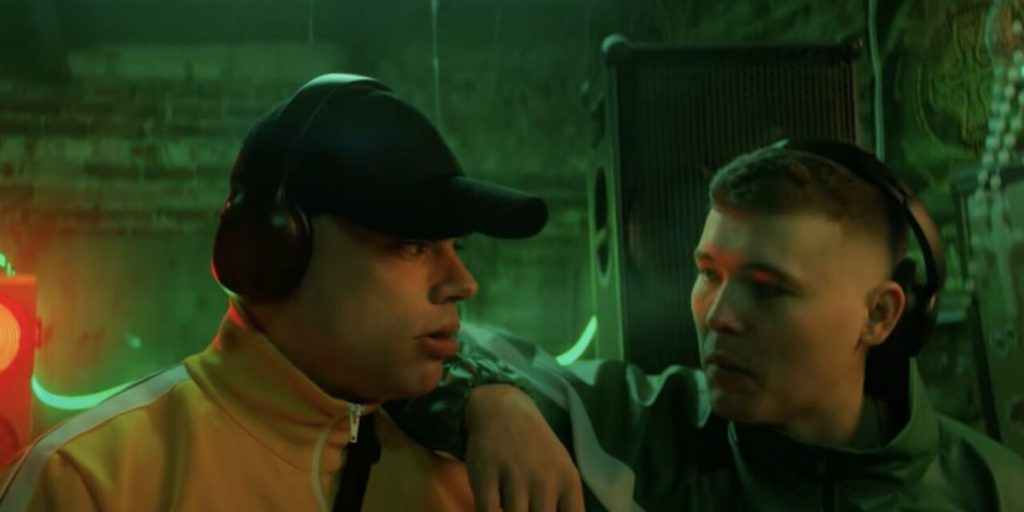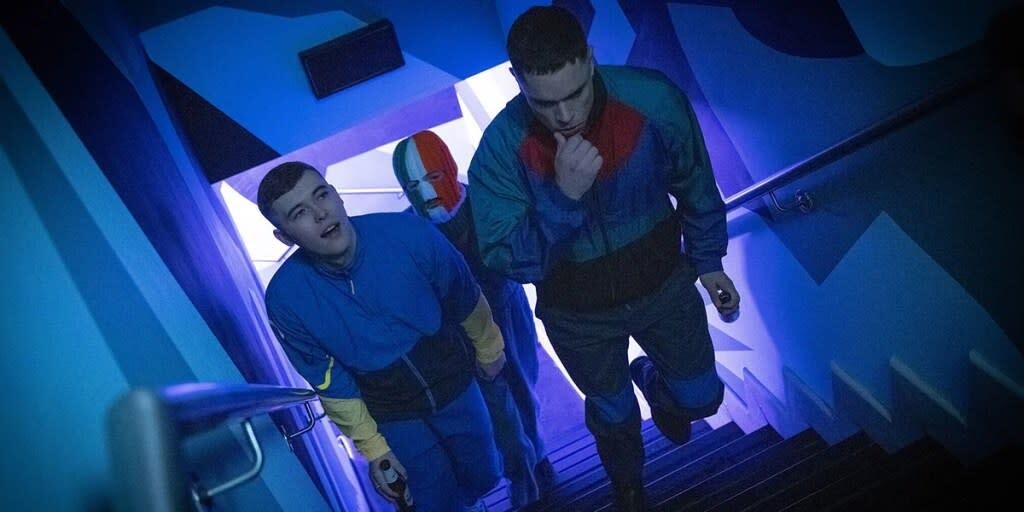Directed by Rich Peppiatt, ‘Kneecap’ tells the story of the titular Belfast hip-hop band and its members as they become engulfed in a movement to restore pride in their Irish language amidst a politically charged environment. The movie is told through the eyes of the band’s founders, Liam Ó Hannaidh, Naoise Ó Cairealláin, and JJ Ó Dochartaigh, providing a closer view into the extraordinary events taking shape through Ireland’s music scene. Although it primarily explores the intricacies of Irish history and politics through a smartly crafted drama about living on the fringes of society, the film also touches upon themes of identity, coming-of-age, music, cultural heritage, family, and generational divide.
Kneecap is Inspired By the Life and Experiences of an Irish Hip Hop Trio
‘Kneecap’ is a fictionalized biopic about a real-life hip-hop band named Kneecap. Written and directed by Rich Peppiatt, the musical comedy dives into the exploits of the three Kneecap members, Liam Ó Hannaidh, Naoise Ó Cairealláin, and JJ Ó Dochartaigh, as they take up the cudgel of forming an Irish-language musical band in the wake of the Troubles. The trio are more popularly known by their stage names – Mo Chara, Móglaí Bap, and DJ Próvaí, respectively. Although the narrative is partially fictional in its depiction, the three strongly influenced the story’s conception, working hand-in-hand with the director to bring a more profound authenticity to their experiences growing up in Belfast, Ireland.

In an interview, Peppiatt said, “Some of the more mundane things in the film are the bits we had to make up, but some of the maddest things in the film are actually the true bits.” A blend between the two helped flesh out the scope of the narrative in a holistic sense. However, one of the pivotal scenes in the film portraying how the idea for the band came to the members is based on real life. According to his own account, Móglaí Bap and his friend were caught spray painting at a bus stop by the police. In the ensuing chase, he continued, his friend was captured and refrained from conversing in English during the interrogation, confining himself mainly to Irish. Subsequently, he spent the whole night in the cell. While this encounter does not play out beat-for-beat in the movie, the filmmaker worked it into the narrative, adding a tinge of realism to the drama.
Another real-life arrangement in the movie is DJ Próvaí’s dual life as an Irish teacher by day and singer-songwriter by night. This dichotomy between the two disparate aspects of his life is summarily portrayed in the film, showcasing how he embraced the so-called “darker side” over time. Even the scene where he streaks a watching crowd with the words “Brits Out” printed on his backside is based on reality. However, the manner in which Móglaí Bap and Mo Chara actually met DJ Próvaí happened slightly differently from the movie’s version of events. “We used to go to, like, gigs and, like, party and stuff together, and we kind of met DJ Provai through that way because DJ Provai used to be, like, a singer-songwriter,” Chara explained.
Kneecap Uncovers Belfast’s Contemporary Issues in the Aftermath of a Civil War
The roots of ‘Kneecap’ are firmly placed in Belfast’s regional peculiarities, eccentricities, and history. The city is more commonly known for its period of political and social unrest during the Troubles era. However, under Peppiatt’s direction, the film decidedly explores the complicated backdrop through a fresh point of view – the younger crowd. Like their fictional counterparts, Móglaí Bap and Mo Chara were brought up in the Irish-speaking community of Belfast, where they experienced the backlash and fallout of the Troubles.

During that time, clashes between Irish nationalists and British soldiers were a common theme. The film provides a deeper look into the social context through the new generation of Belfastians, termed the “ceasefire babies,” who had no part to play in their previous generation’s war. A recurring theme in the movie is the feeling of a generational divide separating the two waves of Belfastians who are fighting for similar beliefs. This is depicted through the conflict between Arlo and his son Naoise.
While the former believes that his involvement during the Troubles made him a target for the British sympathizers in the country, his son is tired of this constant referral to a battle that he cannot reconcile with his experiences. Instead, his struggle for self-expression takes him on a journey of his own. Naturally, the Troubles era takes on a more significant dimension in the narrative because of this dynamic, despite the fact that the present-day issues stem from the fallout of that particular conflict. Instead, it now manifests through a feeling of anxiety and PTSD.
Kneecap is a Compelling Story Celebrating the Irish Language

At its heart, ‘Kneecap’ is about the Irish language and the preservation of an indigenous language in the face of British colonization. The film is set during a time when movements were taking place to recognize Irish as the official language of Northern Ireland. There are constant references to the idea of a nation’s identity being built on its language, which becomes a contentious point throughout the narrative. In a flashback scene, Arlo reminds a young Liam and Naoise to use Irish as much as possible as it is a “bullet” aimed at freedom. The ideological stance is showcased in various sequences, even how the band draws a considerable crowd to its events to enjoy songs primarily in the native Irish tongue.
Director Rich Peppiatt stated, “The film is about the Irish language, but it’s also something that we’ve been really gratified by traveling around the world with the film since Sundance when we won the audience award there, that people are really connecting with it about their own indigenous languages.” The film’s ending scrawl reflects upon the usage of indigenous languages worldwide and how many of them are snuffed out every few days. It brings a stark reality to the conversation about preserving a cultural landmark like a language, and what better way to do so than through music? While ‘Kneecap’ covers a wide range of territory through its exploration of politics and identity, its emphasis on the Irish tongue is its most vital asset and brings a different immersion to the tale.
Read More: Kneecap: Where Are the Band Members Now?


You must be logged in to post a comment.